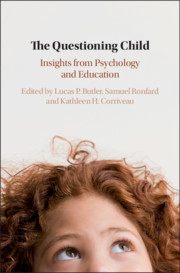Book contents
- The Questioning Child
- The Questioning Child
- Copyright page
- Dedication
- Contents
- Figures
- Tables
- Contributors
- 1 Questions about Questions
- 2 Questions in Development
- 3 The Point, the Shrug, and the Question of Clarification
- 4 The Quest for Comprehension and Learning
- 5 Children’s Question-Asking across Cultural Communities
- 6 The Development of Information-Requesting Gestures in Infancy and Their Role in Shaping Learning Outcomes
- 7 Developmental Changes in Question-Asking
- 8 Understanding Developmental and Individual Differences in the Process of Inquiry during the Preschool Years
- 9 “Why Are There Big Squares and Little Squares?”
- 10 Children’s Questions in Social and Cultural Perspective
- 11 Mothers’ Use of Questions and Children’s Learning and Language Development
- 12 Teaching and Learning by Questioning
- 13 Asking “Why?” and “What If?”
- 14 What Makes a Good Question? Towards an Epistemic Classification
- 15 The Questioning Child
- Index
- References
5 - Children’s Question-Asking across Cultural Communities
Published online by Cambridge University Press: 10 January 2020
- The Questioning Child
- The Questioning Child
- Copyright page
- Dedication
- Contents
- Figures
- Tables
- Contributors
- 1 Questions about Questions
- 2 Questions in Development
- 3 The Point, the Shrug, and the Question of Clarification
- 4 The Quest for Comprehension and Learning
- 5 Children’s Question-Asking across Cultural Communities
- 6 The Development of Information-Requesting Gestures in Infancy and Their Role in Shaping Learning Outcomes
- 7 Developmental Changes in Question-Asking
- 8 Understanding Developmental and Individual Differences in the Process of Inquiry during the Preschool Years
- 9 “Why Are There Big Squares and Little Squares?”
- 10 Children’s Questions in Social and Cultural Perspective
- 11 Mothers’ Use of Questions and Children’s Learning and Language Development
- 12 Teaching and Learning by Questioning
- 13 Asking “Why?” and “What If?”
- 14 What Makes a Good Question? Towards an Epistemic Classification
- 15 The Questioning Child
- Index
- References
Summary
Young children’s questions are ubiquitous around the world, yet question–asking and –answering are cultural practices; we must investigate cultural variation in how these practices develop rather than assume that certain practices are universal. We question an assumption in the literature that children from families of lower income or schooling have “deficits” in cognitive development. In this chapter, we critique deficit approaches and review cross–cultural studies of children’s questions within the frame of avoiding deficit assumptions. We then present findings regarding children’s questions from two studies of family conversation in different communities: a diary study of children’s spontaneous conversations about nature, and a study of parent–child conversations in a sink–and–float prediction task. In both studies, contrary to deficit ideas, we found evidence that children whose parents have lower levels of schooling showed evidence of more science–related reasoning in their questions than did those from the higher schooling group – children in the “basic schooling” group asked more explanation-seeking (not fact–seeking) questions in one study, and more conceptual (not procedural) questions in the other. Asking questions may be a cultural universal, yet our findings reveal diversity and raise questions about normativity, as well as how to define sophisticated reasoning.
Keywords
Information
- Type
- Chapter
- Information
- The Questioning ChildInsights from Psychology and Education, pp. 73 - 88Publisher: Cambridge University PressPrint publication year: 2020
References
Accessibility standard: Unknown
Why this information is here
This section outlines the accessibility features of this content - including support for screen readers, full keyboard navigation and high-contrast display options. This may not be relevant for you.Accessibility Information
- 11
- Cited by
